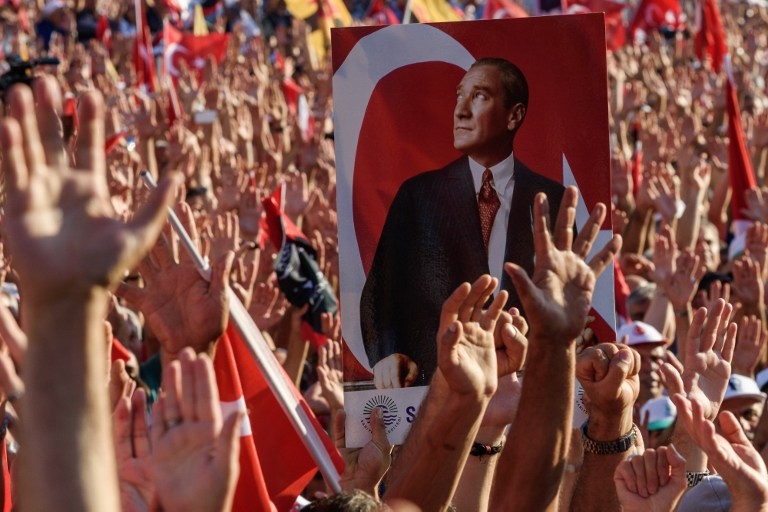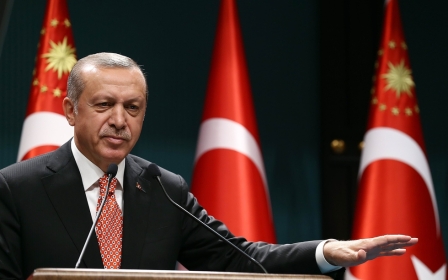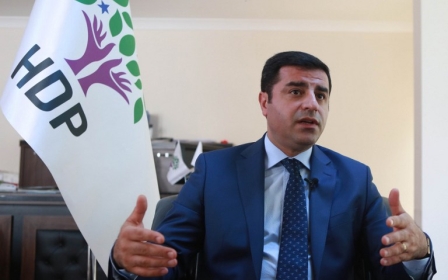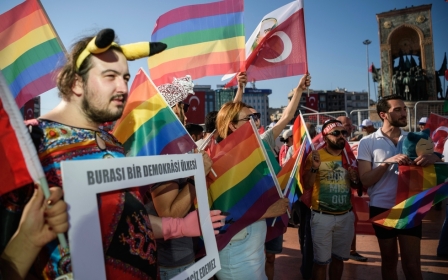'Ataturk's soldiers' rally to Erdogan in rare show of Turkish unity

ISTANBUL, Turkey - Looking out over the sea of tens of thousands of rippling red flags in Istanbul’s Taksim Square on Sunday night, it would have been easy to assume the giant anti-coup rally was a staunchly leftist affair.
The crowd was carpeted with tributes to Mustafa Kemal Ataturk, the founder of the modern Turkish republic and a symbol of the country’s once-strictly enforced secularism that has been diluted under 14 years of rule by Turkish President Recep Tayyip Erdogan’s Justice and Development Party (AKP).
His face was held aloft on posters. The crowd chanted: “We are Ataturk’s soldiers!” Kemal Kilicdaroglu, the current leader of the party Ataturk founded, the Republican People’s Party (CHP), thundered from the stage.
The rally was organised by the CHP with the backing of the ruling party. The tone was very different from the gatherings in the same spot over previous nights, when crowds had chanted Erdogan’s name and shouted “Allahu akbar!” - God is great.
But as the throngs began to disperse (and it became easier to move) it grew clear that the assembled crowd was much more diverse than it had first appeared.
Sinan Colak, 41, a furniture maker from the Black Sea who backs the ruling party, had no problem with attending an opposition rally.
“The whole nation is together,” he said. “Just like during the coup attempt. There are no divisions.”
A trio of teenage girls in jewel-coloured headscarves described themselves as supporters of the right-wing Nationalist Movement Party (MHP) and said that they were thrilled to be at the event.
They spoke openly about inclusivity not just across the political spectrum but also for ethnic and religious minorities - Kurds, Alevis, Jews.
There was a sense of excitement that the sands of Turkey’s hitherto deeply divided political landscape could shift in the wake of the failed coup attempt that saw ordinary citizens take on the tanks.
The talk of unity clearly papered over deeply contrasting ideologies. Everyone at the rally said that they were there for “the flag”, “the nation”, “democracy” - but the meaning of those terms and symbols differed according to the eye of the beholder.
For Behiye, 70, a self-proclaimed daughter of Ataturk with a flicked hair style reminiscent of 1970s American TV star Farrah Fawcett and a floral neck-tie, it was about protecting the secularism that she felt had suffered under the ruling party.
Celal, 23, a graphic designer who supports the AKP, said that it was about the freedom for Muslims to practice their religion and wear whatever they wanted.
But the sympathy for President Erdogan, who narrowly escaped being killed or captured during the coup attempt, was striking.
Cumhur, 43, a mechanical engineer from Istanbul who described himself as a CHP supporter, said that he was no particular fan of the president, but said: “From now on he will definitely change.”
He explained: “He saw the people at his side, even the people who don’t like him. For 15 years he has been frightened of a coup. He has no need to be frightened anymore.”
Behiye, the CHP voter, said that she believed that the president felt indebted to the people for saving his life.
“He was afraid of dying,” she said. “He was very, very frightened.” Her friend Suraya chipped in: “From bad things, good things can happen.”
The breadth of support for Erdogan on display on Sunday night appeared comes amid concerns in the aftermath of the coup attempt about the scale of the crackdown, with tens of thousands of people suspended or detained over alleged links to the plot.
Many of those connected to organisations associated with Fethullah Gulen, the US-based cleric singled out by the government as the alleged mastermind of the coup, are now terrified for their future and even for their personal safety.
Turkish media reported on Monday that arrest warrants had been issued for 42 journalists allegedly linked to the movement.
A series of public intellectuals have warned that the grand purge against alleged plotters will also engulf not just Gulenists but also others simply opposed to the government.
There are deep concerns too about the right to a fair trial for those who are accused. Just hours before the crowds assembled in Taksim, Amnesty International said that it had credible evidence that those in detention were being subjected to beatings, torture and rape.
On Monday Erdogan hosted the leaders of the opposition CHP and ultra-nationalist MHP at the presidential palace in Ankara. Some see that, along with the decision to allow the opposition to stage Sunday’s rally, as an uncharacteristically conciliatory gesture by a man who has built his career on a divisive, winner-takes-all style of leadership.
Cynics do not expect the show of political unity by the main parties to last, while the pro-Kurdish HDP, which also came out against the coup, remains in the cold.
The HDP holds 59 seats in parliament, compared to the MHP’s 40, but has been repeatedly accused by the government of being too close to the banned Kurdistan Workers’ Party (PKK).
But, in Taksim Square on Sunday night, most of the anger on display was reserved for foreign media coverage of the aftermath of the coup attempt, which most believed had been relentlessly and excessively negative.
Even those naturally inclined to be deeply sceptical of the government were, for the time being, erring on the side of optimism.
“We have so many questions,” said Servet, a 26-year-old master’s student who did not give his full name.
“We want the opposition’s voice to be heard. We question the arrests. We don’t believe the government totally. But right now we are on the same side.”
New MEE newsletter: Jerusalem Dispatch
Sign up to get the latest insights and analysis on Israel-Palestine, alongside Turkey Unpacked and other MEE newsletters
Middle East Eye delivers independent and unrivalled coverage and analysis of the Middle East, North Africa and beyond. To learn more about republishing this content and the associated fees, please fill out this form. More about MEE can be found here.




